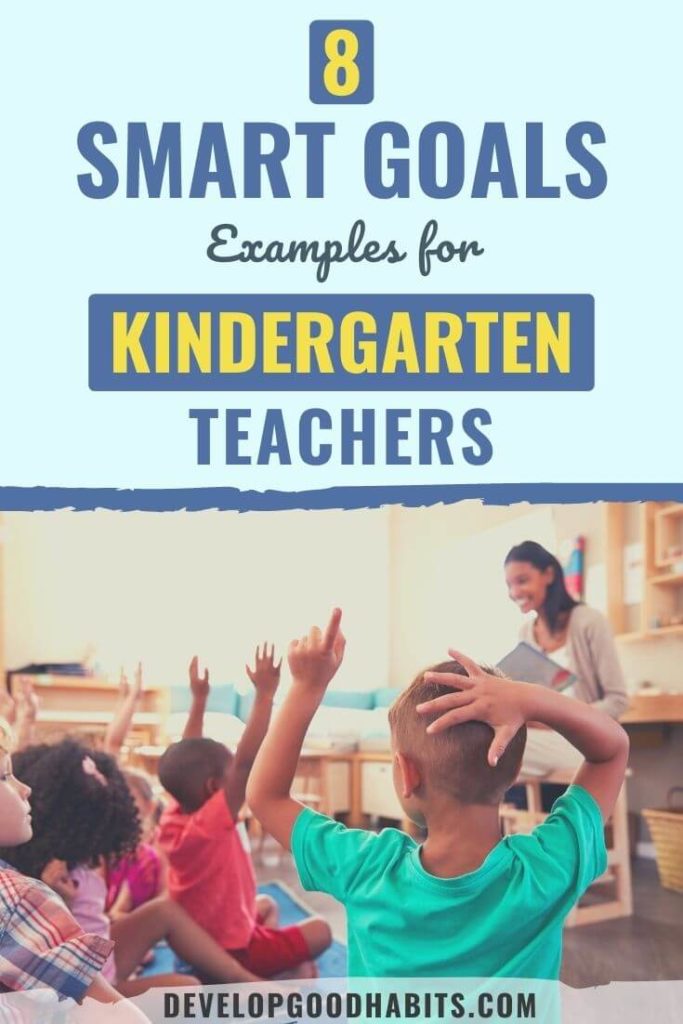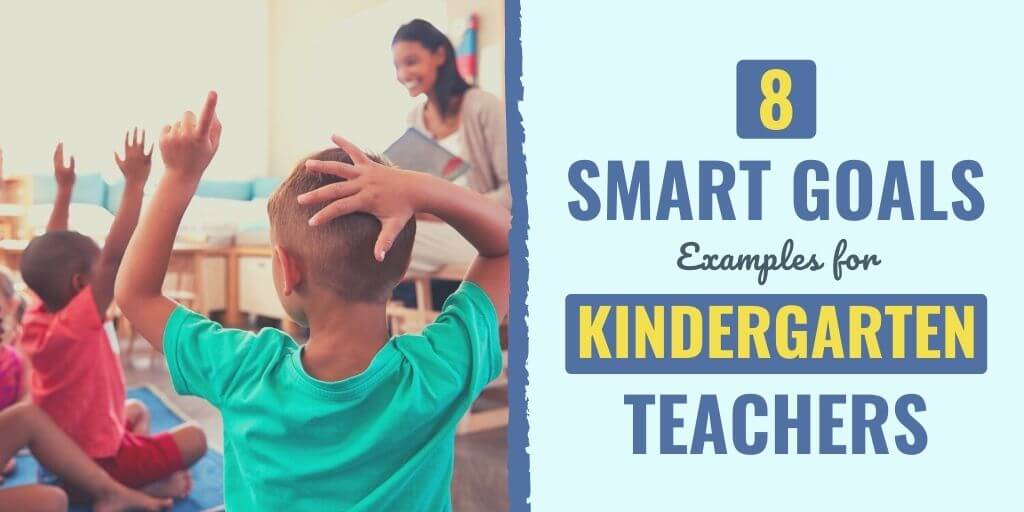There might be affiliate links on this page, which means we get a small commission of anything you buy. As an Amazon Associate we earn from qualifying purchases. Please do your own research before making any online purchase.
Kindergarten is one of the most crucial periods for a child's development. Hence, kindergarten teachers have a massive responsibility as teachers and as caregivers. Self-work, professional improvement, and improvement of the kindergarten itself can all be very beneficial to the children.
But how to tackle this big quest? SMART goals can be a right fit for any kindergarten teacher. In this article, you'll find eight examples of SMART goals for kindergarten teachers.
What Are SMART Goals?
SMART goals are not your ordinary list of goals you establish for the distant future without any real strategies to reach them. It's common to see phrases like, “I want to purchase a mansion in the future,” which is completely fine, but it's not a SMART goal.
SMART goals are more like an action plan for achieving your goal, with each acronym standing for a specific characteristic. Let's take a closer look at what each letter means:
Specific
The more you specify your goals when writing them down, the better. You should think about the famous “W” questions and answer them.
This will assist you in having a clear picture of the milestones you want to reach that will eventually lead you to achieve your goal.
Measurement
How will you know when a milestone is reached? This is why your goals have to be measurable. When writing down your goals, think about questions like “How many?” and “How much?” For example, if your goal is to run one kilometer per day, every day you run a kilometer will count. Progress may be easily tracked in this way.
Achievability
While it's OK to shoot for the stars, a SMART goal should be achievable. Try to break up bigger goals into smaller ones that are reachable with your current skill set. Then, as you go along your journey, you can gradually set bigger goals. This will help you keep up your motivation.
Relevancy
Why are you setting this goal? How does it impact the bigger picture? Every plan should have a purpose and bring you a step closer to your end goal.
Time-Bound
Your goals should have a set deadline to help you stay motivated by giving you a sense of urgency and will also help you measure your goals. Select time frames you're comfortable with, whether that means setting daily, weekly or monthly goals.
If this topic strikes your curiosity, you may go further in-depth by checking out the Ultimate guide for SMART goals.
Why SMART Goals Are Important for Kindergarten Teachers
Kindergarten teachers are frequently faced with the challenge of educating a diverse group of students. Some children come to preschool already knowing the basics, while others are making their way into a classroom environment for the first time. The teacher has to find a way to overcome these differences and consider the different learning strategies and children's interests.
In kindergarten, getting children ready for school is the primary goal. Having a broad understanding of early childhood development is essential for preschool teachers to construct a program that makes a big difference. To develop lesson plans and procedures for evaluation, it is necessary first to establish wide-ranging learning goals.
Moreover, organizing and managing the kindergarten space is also the responsibility of the kindergarten teacher. By improving the area where the children spend most of their day, they will feel more comfortable when in class. This will result in more participation and better adjustment to a school environment.
Kindergarten teachers can find ways to overcome the different challenges they face every day by setting SMART goals. It can also help them improve their child development knowledge, teaching skills and strengthen their relationship with their students.
8 SMART Goals Examples for Kindergarten Teachers
The examples here are helpful for any kindergarten teacher and can inspire your own SMART goals kindergarten list. Feel free to use the examples and change them to fit your end goal as a kindergarten teacher.
1. Organize Crafting Sessions
“For the next two months, I will organize crafting sessions once a week to help my students learn how to use scissors, writing implements, and paintbrushes to prepare them for their upcoming school experience.”
S: This specific goal describes how the teacher will prepare the children for their school experience.
M: Each session counts as a unit of measurement.
A: This goal is achievable.
R: The goal is relevant for kindergarten teachers.
T: The goal will be completed in two months.
2. Assess Writing Skills
“In the next two weeks, I will spend 15 minutes per day teaching each preschool child to write their name to assess their writing skill and reduce the skill differences among them.”
S: It explains that the teacher will spend a stated amount of time doing a specific activity to evaluate and work on the student's writing skills.
M: Every time the teacher spends 15 minutes teaching the children how to write, their name is counted.

A: This is an achievable goal.
R: The goal is relevant for kindergarten teachers.
T: The deadline for the goal is two weeks.
3. Read Books on Child Development
“Over the next month, I will spend an hour three times a week reading books about the latest research in child development for kindergarten children to improve my knowledge and come up with better activities and lesson plans.”
S: This is a very specific goal where the teacher wants to improve their knowledge by reading to create better-structured lessons for the children.
M: Each hour of reading is a unit of measurement for this goal.
A: It is an achievable goal.
R: This goal is very relevant for any kindergarten teacher.
T: The goal will be finished in one month.
4. Encourage Love of Reading
“Over the next two months, I will encourage a love of reading and words by incorporating dedicated reading time each day to develop their language skills as well as to prepare them for school.”
S: This SMART goal is specific because it includes what the teacher will do to improve the children's language skills.
M: Each reading session counts as a measurement.
A: This goal is achievable.
R: The goal is relevant for kindergarten teachers.
T: The goal will be finished in two months.
5. Meet with Parents
“Over the next month, I will have a meeting with the parents where we will discuss the children's interests and skills to create more appropriate lesson plans and to assess the children better.”
S: This is a specific goal to improve the lesson structure and evaluation with the help of the children's parents.
M: The unit of measurement for this goal is the meetings with the children's parents.
A: This is an achievable goal.
R: This goal is relevant for improving and optimizing kindergarten teachers' lesson plans and evaluation methods.
T: The goal will be completed in a month.
6. Play Upbeat Songs
“Over the next two weeks, I will play upbeat, happy songs at the beginning and end of the day to relax the children and make them more comfortable.”
S: This goal is specific because it tells us which type of songs the teacher will play for the children to feel more relaxed and comfortable.
M: Every time a song is played counts as a measurement.
A: This is an achievable goal.
R: The goal is relevant to improve the overall kindergarten experience for the children.
T: The goal will be finished in two weeks.
7. Speak with Children
“In the next week, I will spend half an hour daily to speak with the children about their interests and needs to get them to know better and improve my relationship with them.”
S: The teacher will dedicate time each day for a conversation to improve student-teacher relationships.
M: The unit of measurement here is every half an hour spent talking with the students about their interests and needs.

A: The goal is achievable.
R: The goal is relevant for kindergarten teachers and improving the children's kindergarten experience.
T: The goal will be completed in one week.
8. Incorporate Group Work
“I will incorporate activities that require the children to work together in groups each week for the next two months to develop their teamwork skills and improve the relationships among them.”
S: The goal is specific since the teacher will do a particular activity every week to introduce the children to group work.
M: Every time a group activity is chosen counts as a measurement.
A: It is an achievable goal.
R: The goal is relevant for any kindergarten teacher.
T: The goal will be completed in two months.
Final Thought on SMART Goals for Kindergarten Teachers
Incorporating some of these goals or similar ones to your SMART goals kindergarten list will keep you motivated and help you have a clear idea of how to improve. This will result in the children being more comfortable during their kindergarten period and improving the skills necessary for school. It's essential not only for their school preparation but also for their social and communication skills.
Would you like to know more about how setting goals can improve your professional and personal life? Feel free to check out this article by clicking here.
And if you're looking for more examples of SMART goals for educators, check these blog posts:
- 10 SMART Goals Examples for Education and Educators
- 11 SMART Goals Examples for Special Education Teachers
- 10 SMART Goals Examples for an IEP (Individualized Education Program)
Finally, if you want to take your goal-setting efforts to the next level, check out this FREE printable worksheet and a step-by-step process that will help you set effective SMART goals.


